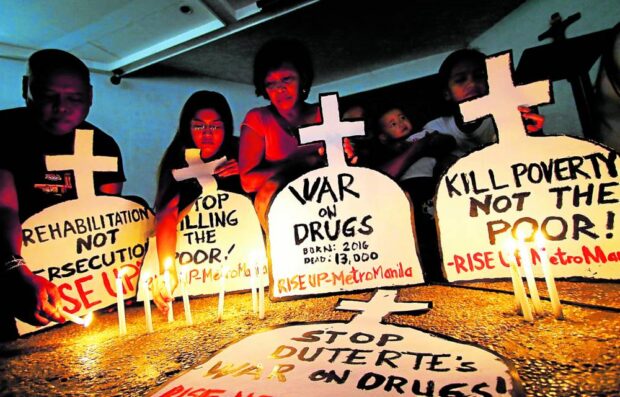
OF TEARS AND ‘TOKHANG’ Relatives of victims of extrajudicial killings attributed to the Duterte administration’s war on drugs gather at Caritas Manila’s office in Pandacan, Manila, on All Saints’ Day in 2017. —RICHARD A. REYES
WASHINGTON—President Marcos on Thursday (Friday in Manila) acknowledged that “abuses” were committed and that the human rights situation became a cause for concern during the previous administration, when his predecessor Rodrigo Duterte waged a bloody antidrug crackdown that claimed the lives of thousands.
“In my view, what had happened in the previous administration is that we focused very much on enforcement,” Marcos said at a forum by the Center of Strategic and International Studies on the fifth and last day of his working visit in the US capital.
“And because of that, it could be said that there were abuses by certain elements in the government and that has caused some concern with many quarters about the human rights situation in the Philippines,” he added.
‘Stronger, wealthier’
The President also noted that even after the antidrug campaign waged during Duterte’s time, “The syndicates have grown stronger, wealthier and more influential, worryingly so.”
“But instead of going after everyone,” he said, his administration “(tried) to identify the key areas that we have to tackle … so that we can see a diminution of the activity of the drug syndicates.”
“We are looking at the problem as a whole,” Marcos explained further. “We start with the errant policemen, [then] we go back to the rehabilitation process for those who have unfortunately fallen into this addiction cycle.”
He said his administration’s “change in policy” in its approach to the drug war was based on the premise that street-level drug pushers did not have the means to run the syndicates. But Marcos stopped short of pursuing that point when pressed further, saying that… “I’m in no position to assess the administration of anybody else. That’s not a proper role for me to take.”
In March, Marcos had also said the Philippines would “disengage” from the International Criminal Court after it rejected the government’s appeal to suspend its inquiry into Duterte’s drug war—although Solicitor General Menardo Guevarra later clarified that the appeal continues “unless President Marcos orders its withdrawal.”
‘Big guys’
The President’s predecessor is the father of his running mate in the 2022 election campaign, now Vice President Sara Duterte.
When still a presidential candidate, Mr. Marcos had suggested that he would reorient the drug war, Duterte’s centerpiece policy, saying he would rather go after the “big guys” rather than small players.
He reaffirmed this departure from Duterte’s drug war last year during his first visit to the United States as President.
“It is certainly my view that enforcement, which has been the part of the drug war that has been most vigorously pursued by President Duterte, only gets you so far. And my approach is slightly different,” Marcos said at a forum by the Asia Society on Sept. 23.
“[In] my first command conference with our policemen, I said we will adjust. Let us adjust our focus …. As to the enforcement, to put it very bluntly, I simply told them, ‘Look I’m not interested in the kid who makes P100 a week selling weed.’ That’s not the person that I want you to go after,” the President had also said.On Oct. 8, 2022, two weeks later, the Philippine National Police conducted a raid in Manila, which led to the seizure of almost a ton of illegal drugs with an estimated street value of P6.7 billion—its biggest drug haul yet.But that operation would be mired in controversy even several months later, as police, upon the urging of Interior Secretary Benhur Abalos, began looking into possible irregularities in the conduct of the raid, including the alleged pilfering of the confiscated drugs.
Napolcom’s list
Abalos on Wednesday said the National Police Commission (Napolcom) would soon release a list of PNP officials whose resignations are recommended for Marcos’ acceptance, in line with the President’s earlier call for the courtesy resignations of all police officials.
The list is based on Napolcom’s assessment of police officials who may be involved in the drug trade.
Marcos had disclosed earlier that two police generals had already been “separated from the service” due to their drug links and more than 30 other officials were being investigated.
In his speech on Friday, he noted that “Those managing them [the drug syndicates] were those at the top, sometimes including police officials and others in the government. They are the ones we’re running after.”
Meanwhile, Phil Robertson, deputy Asia director for New York-based Human Rights Watch, said Marcos’ remarks on Friday should impel him to “do the next logical and just thing: order the criminal prosecution of police officers implicated in abuses in the drug war.”
Robertson, however, also expressed skepticism toward the President’s recent statements, including his vow to conduct an “internal cleansing” of the PNP.
“In reality, this ‘cleansing’ is a token response designed for propaganda more than anything else,” the human rights advocate said.
—WITH REPORTS FROM INQUIRER RESEARCH, DEXTER CABALZA AND DEMPSEY REYES
Source: Inquirer Archives